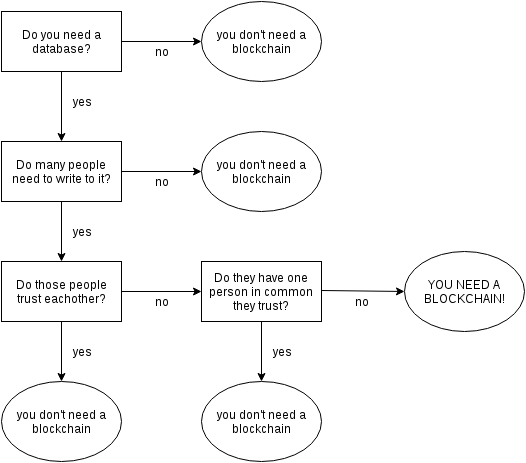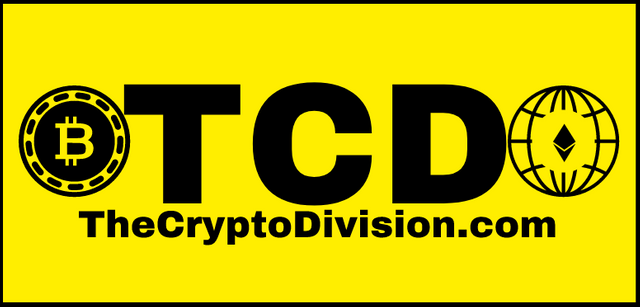Do you really need a blockchain?
Introduction:
There has been a ton of hype around ICOs last year. In 2017 alone startups raised $5.6 billion using ICOs as a funding method. There were 435 successful ICOs launched raising an average of $12.7 million. However, a common problem with the ICOs is the returns to investors are mainly available to early investors. But the current trend, for most ICOs after launching, is a slow decay downwards. This leads me to believe that many of those ICOs don’t really need a blockchain or a utility token/coin. But some coins do. So the question is: How do we differentiate between what needs a blockchain/coins and which projects don’t.
The need:
If you’re investing (or gambling as the case may be) in cryptocurrencies this question must be answered first, above everything else - “is a blockchain and decentralization needed?”. If a project doesn’t NEED a blockchain it most likely fail. It will fail because blockchains are inefficient, space-consuming, and often difficult to upgrade due to decentralization.
So what projects need a blockchain?
“Projects linking more than one untrustworthy party.”
At its core a blockchain excels at providing trust in a trustless environment. There is little application for decentralized ledger technology past that application. We can narrow these down to a few main questions but here’s a good flow chart from @Ivan_Dov detailing if you or a project really need a blockchain.

After looking at a prospective project and then looking at the graphic above we decide that the project designers made the right choice in choosing a blockchain - well great. But we still need to ask two more questions:
Do they need a public or permissioned blockchain?
Do they need a utility token?
Public vs permissioned blockchains:
Public blockchains offer a unique feature - anyone can join the network, create nodes, produce blocks, or transact on the network - Bitcoin and Ethereum are both public blockchains.
But permissioned blockchains are like what they sound - the creator has to grant permission to individuals in order to join the network, create a node, and produce blocks. A example of a permissioned blockchain is Ripple (XRP). The developers have only allowed MIT, Ripple labs, CGI, and Microsoft as transaction validators.
In my opinion, permissioned blockchains aren’t needed in the first place. The mere fact that you allow people to be validators on the network means there is a trusting party. That trusting party can just as easily facilitate transactions between two non-trusting parties. This exposes a critical flaw with permissioned blockchains, showing that projects that rely upon this technology would be better off using another system.
I’d hesitate to invest in any permissioned blockchain coin as it doesn’t utilize the full scale of blockchain technology. Although, I do know that some permissioned blockchains are planning to decentralize themselves into full public blockchains but the process is long and hard. Generally speaking, if there is no solid use case for the cryptocurrency - avoid permissioned blockchains.
Utility tokens or shitcoins:
Let's face it… There’s a ton of cryptocurrencies out there that do not serve a purpose.
In my opinion, there are two things needed to determine if the cryptocurrency has value:
Do a systematic review of the network.
Determine if the cryptocurrency provides real value to humans.
Unfortunately both are fairly subjective criteria to use for valuation. But the first “systematic review of the network” you should already be doing to invest in a cryptocurrency by reading the white paper, looking at pros and cons, ect.
In doing your analysis it should become clear if the cryptocurrency ADDS VALUE to the network or performs a service that can’t be found by typical fiat currency.
For example Monero is a great example of a cryptocurrency that can’t be replicated by fiat. Transacting privately with another individual across borders or over the internet quickly, privately, and securely. With fiat you can transact securely and privately with cash - assuming noone is watching you or following you. But with cash you cannot transact across the internet/borders without physically transporting it yourself or through a trusted member of your organization. This is an example of a cryptocurrency providing real value to humans.
But an example of a utility token not providing the network with additional value is Dentacoin. The sole purpose of it is to provide payment to dentists. This can easily be accomplished by the fiat.
Summary:
Investing in a cryptocurrency that does not really need a blockchain or a token/coin might result in catastrophic investment loss. Typically speaking permissioned blockchains likely don’t NEED a blockchain to operate. And coins that don’t demonstrate their value to the network by being irreplaceable or provide real value to humans are ultimately worthless.
As always, do your own research and don’t invest more than you are willing to lose.
Disclaimer:
I own Monero and Ripple. I was planning on uploading this to my website but my admin page seems to be not loading the CSS and won't let me add posts. I plan to take a look at it over the weekend and then upload this article once I get it sorted out.
Thanks for reading! Don't forget to upvote and reblog :D
Follow me on:
Website: http://www.thecryptodivision.com/
Twitter: https://twitter.com/CryptoDivision
Facebook: https://www.facebook.com/TheCryptoDivision/notifications/
Steemit: https://steemit.com/@cryptodivision

Excellent arguments. Have an upvote and a new follower. I agree with your arguments but that is a programmers tree, as oppose to an investor or analyst's tree.
Before investing think 1. Does it have demand? 2. Will that demand lead to profitability? 3. What is the price, supply, marketing team, competition etc. Like?
Too many people analyze blockchains like they would grade a scientific paper. As an investor I don't care about anything except making money.
Lol found these two on reddit kinda related, I've been thinking about this allot:
https://www.reddit.com/r/programming/comments/7zcggb/no_you_probably_dont_need_a_blockchain/
https://www.reddit.com/r/programming/comments/7ntbp8/ten_years_in_nobody_has_come_up_with_a_use_for/
The articles and the comments on there are interesting. Anyways nice writeup will be following you :)
Coins mentioned in post:
I like this. Followed you
Thanks for the follow!
Good article. When it comes to smart contracts its a big question whether or not one actually needs a blockchain and whether or not you really need the application to be decentralized and what will the benefit be. At the moment blockchain is really just being used as a buzzword when you look at job posts for example. I agree with what you said about permissioned blockchains and what you implied about XRP :).